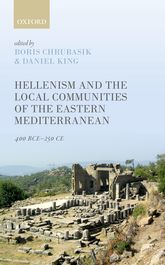This volume focuses on questions of Greek and non-Greek cultural interaction in the eastern Mediterranean and the ancient Near East during a broadly defined Hellenistic period from 400 BCE–250 CE. While recent historiographical emphasis on the non-Greek cultures of the eastern Mediterranean is a critical methodological advancement, this volume re-examines the presence of Greek cultural elements in these areas. The regions discussed—Asia Minor, Egypt, the Levant, and Mesopotamia—were quite different from one another; so, too, were the cross-cultural interactions we can observe in each case. Nevertheless, overarching questions that unite these local phenomena are addressed by leading scholars in their individual contributions. These questions are at the heart of this volume: Why did the non-Greek communities of the Eastern Mediterranean engage so closely with Greek cultural forms and political and cultural practices? How did this engagement translate into the daily lives of the non-Greek cultures of Asia Minor, the Levant, Mesopotamia, and Egypt? Local engagement differed from region to region, but some elements, such as local forms of the polis and writing in the Greek language, were attractive for many of the non-Greek communities from fourth-century Anatolia to second-century Babylon. The Greek empires and the Greek communities of the Eastern Mediterranean, too, were transformed by these local interpretations. The presence of adapted, changed, and locally interpreted Greek elements deeply entrenched in each community’s culture are for us the many forms of Hellenisms, but it is ultimately these categories, too, that this volume wishes to examine.
Publication Type
- Book



